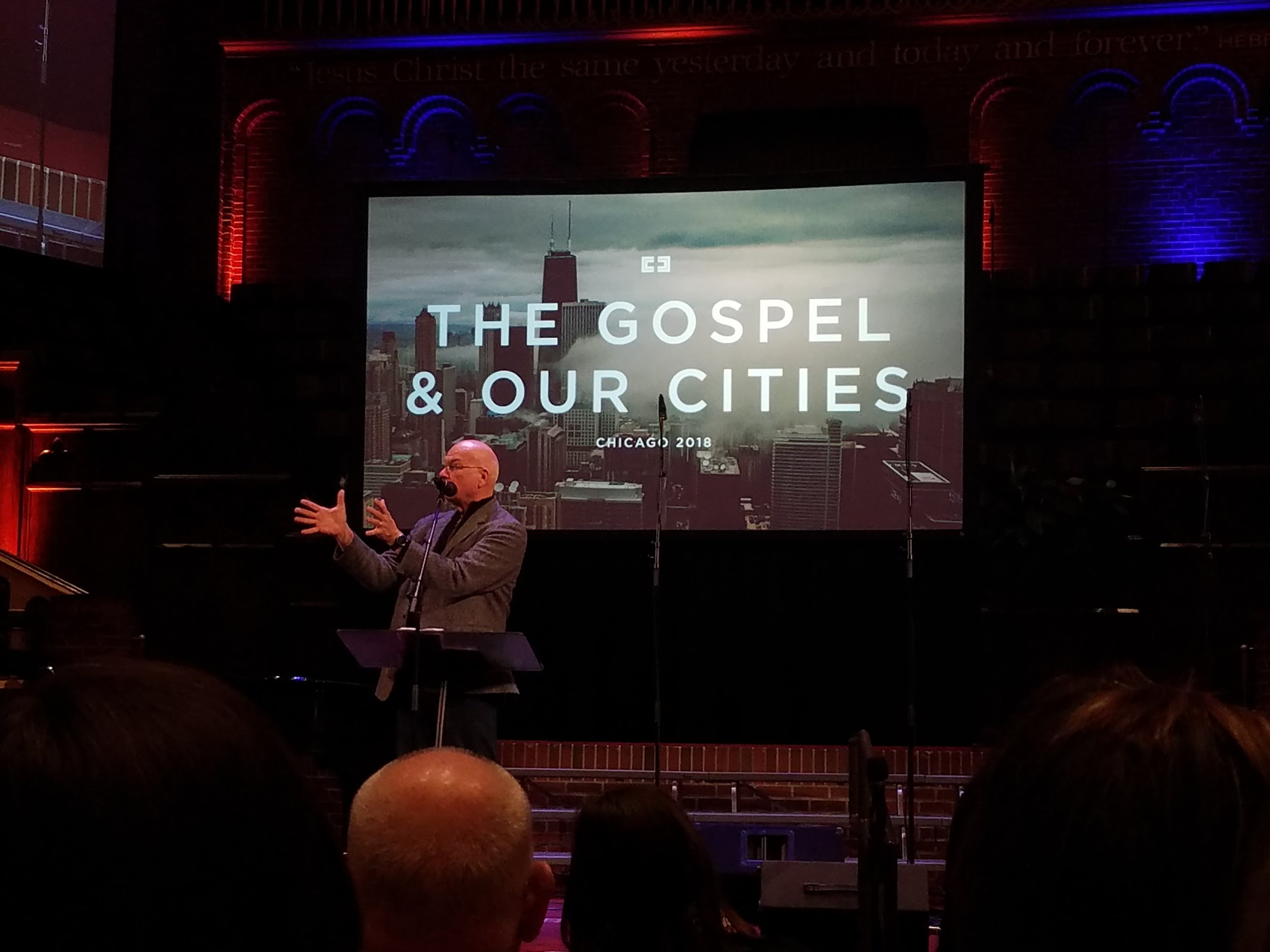Dr. Tim Keller, The Gospel and Our Cities Conference
This post was written by Stephen Nielsen.
The Gospel and Our Cities is a conference organized by City to City North America. This year’s inaugural conference theme “Hope for North American Cities” began with the vision to inspire the attendees to equip them to reach their cities with the gospel. Dr. Tim Keller, a Presbyterian minister and co-founder of Redeemer City to City, was the highlight speaker of the conference. Vista staff and writers attended the conference; follow more of Vista’s online posts to see how North Park students experienced The Gospel and Our Cities.
Dr. Keller’s spoke in two parts, answering the question of “How do we have a missionary encounter in a post-Christendom world?” Christendom is what churches in America experienced around 30 years ago, when there was social value to going to church. People had pre-determined religious or Christian beliefs; there were moral absolutes and sin and guilt were things people believed.
A post-Christendom world is one that exists in the Western, scientific world. “America might not ever be as secular as Europe,” Keller said, “but every five years the landscape changes.” This post-Christendom world is essentially a world where people don’t understand Christian or religious beliefs or values. This makes the former way of evangelism obsolete.
Evangelism in a Christendom world looked like taking people’s pre-determined religious beliefs and turning them into Christian beliefs, Keller explained. “But what happens if no one has these pre-determined religious beliefs?” To answer this question, and to have a missionary to encounter, Tim Keller gave five marks:
People must have Christian high theory apologetics.
There needs to be a post-Christendom Evangelism Dynamic
We need a category defying Christian social program or movement
Counter catechesis is a necessity.
There needs to be Grace to a point.
Just as Dr. Keller worked through the list chronologically, so will we.
1. Christian High Theory Apologetics
Modern Christians do not critique the society they live in like the early Christians such as Augustine. Keller believes that Christians hold society’s standards in too high regard, and that there aren’t enough people critiquing the current societal standards. Christians need to critique the cultural standards through a gospel-centered view, like earlier Christians.
Because Western society is science based, it has moved away from being held accountable by nature. “We are disembodied from nature… We tell nature that it doesn’t matter unless only our needs are met,” Keller said. He then explained three other faults of our society. That values are now relative, relationships are transactional (a “as long as it benefits me” attitude), and people are hyper fragile. These, he said, were what modern freedom is.
The modern, freed self is a buffered self. People pull their identity from what they tell themselves, instead of gathering other information from people outside themselves. People hold an attitude that states “my feelings are more real than anything else.” Because people want to define themselves, that makes them fragile. As soon as people hear something that doesn’t line up with their own narrative, they fall apart, “not everyone sees you as you do, or as you want to be seen.”
2. A Post-Christendom Evangelism Dynamic
“Evangelism is not in programs and CDs, but talking about Jesus to the people around you.” Keller claims that if Christ is central in your life, everyone around you should know about it, “if not, you’re hiding your true self.” Production value won’t bring more people into church, but what will is infusing Christian members with the missional living like the early Christians did; talking about their faith with everyone.
But, how do we get people convicted if they don’t think sin exists?
Keller used an analogy. Christian beliefs are like a suit which is too big. There is always room to learn more. Non-Christian beliefs are like a suit that is too tight, always pinching, and eventually it will rip. When the suit rips, that’s when life crumbles; there is not enough room for their ideology and questions to fit.
There are four ways Dr. Keller gave to show people when their suit rips, in Justice, Freedom, Identity, and Beauty. In each, the world’s standards are always changing and there is nothing in the world that fulfills those desires. “You have to wait until their suit rips,” Keller said, only then can you talk to them about what happened and how “nothing will fulfill them in that except for God.”
3. A Category-Defying Christian Social Project
Bryan Loritts spoke about a similar topic. Read Vista’s recap of Bryan’s lecture.
To illustrate what Christians need, and what Christians have accomplished in this, Tim Keller used the early Christians’ success in Pagan culture. While Christians living amongst the pagans were by far the most prosecuted Christians at the time, that Christian community grew because shared these five marks:
They were multi ethnic/racial community
They cared for and wanted justice for the poor
They were non-retaliatory. In a shame and honor culture, they always forgave.
They were against abortion and infanticide - there was not gradation of human value
They lead sexual counter-culture. It was sexual revolution in a time where sex was an appetite, but they showed that sex was not for self-gratification but for self-giving (1 Corinthians 7).
Dr. Keller suggested that points 1 and 2 sound more like what people who vote Democrat could get behind. Points 4 and 5 sound more like what Republicans advocate for. But the third mark is neither! He was quick to point out that in Christ, you cannot choose the points that you like. To lead a category-defying project, Christians need to live out all of these marks of a Christian community.
“If you drop some, you won’t change the world, the world will change you.”
4. Necessity of a Counter Catechesis
For those who were unsure of what catechesis or a catechism was, it is a summary of the principles of Christian religion in the form of questions and answers, used for the instruction of Christians.
Christian teaching, especially with children and teens consists of teaching Christian truths but not deconstructing the world around them. People spend around 8 hours on social media every day. Keller contrasted this with the maybe one hour of youth group each week, “what do you think will win?” he asked.
For this to work, pastors and teachers need to not only give Christian truths, but also show what parts of the message is right, but what is wrong. The process should be to identify the Christian truths, affirm (explain why it is partially true), subvert (why this doesn’t work), and redirect to cultural catechisms (show why it works in Jesus). By going through this process, Keller says that you can show people that “this (Jesus) is the real thing you are looking for.”
This is about showing people that when they cannot fill themselves or image with the world, there is something that, when they find their image in God, they find what they are looking for.
5. Grace to a Point
The gospel of grace gives Christians a certainty of God’s love, which means that there is no need to bolster themselves for any reason. Christians, when they find their identity in Christ, their future is secure. “Religion is a battle between human pride and God’s grace,” Keller said, “God’s grace must win every time.” This battle is the one between the desire to be right and righteous and remembering that no matter what, “grace is received, not achieved.”
Dr. Keller explained that the problem with people, is that everyone has the me-first attitude, “your life to serve mine.” Christians must remember, Keller exhorted, that “gospel grace destroys self-righteousness, nothing else does.”
So, how do you have a missionary encounter in cities in a post-Christendom world?
“Only when the church is full of people who have lost to God’s grace, will we have a missionary encounter.”








